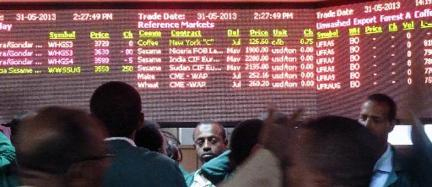Smell the coffee: Ethiopia’s commodity exchange boosts growth
 Addis Ababa, Ethiopia – A bell rings and the floor of Ethiopia’s Commodities Exchange is flooded with traders dressed in coloured coats, waving hands and shouting bids for coffee, sesame seeds or haricot beans.
Addis Ababa, Ethiopia – A bell rings and the floor of Ethiopia’s Commodities Exchange is flooded with traders dressed in coloured coats, waving hands and shouting bids for coffee, sesame seeds or haricot beans.
Following a feverish shouting match, prices are agreed upon and the deal is sealed with a high five between buyer and seller.
Established in 2008, the ground-breaking ECX has boosted exports in Ethiopia, improved conditions for producers and is now inspiring other countries in resource-rich Africa to set up their own exchanges to ensure they are the main beneficiaries of commodity exports.
It has allowed “price discovery” for farmers, ECX chief executive officer Anteneh Assefa said, explaining that previously producers had little knowledge of international market prices and could only rely on middlemen who pocketed hefty profits by selling on heavily marked up goods.
“Most African countries have their economies based on agriculture, so in my opinion, they need to have commodity exchanges to make price discovery (available to producers),” ECX chief executive officer Anteneh Assefa told news agency AFP.
“Some African countries have visited the Ethiopian commodities exchange and some are trying to emulate this model,” he added.
Many visitors
Visitors have included the presidents of Nigeria and Tanzania, as well as delegations from Mozambique and Sudan.
ECX, one of only seven commodities exchanges in Africa, currently trades three main products: coffee, haricot beans and sesame seeds.
It has 329 registered members  which includes traders and producers  who work with some 12,000 people nation-wide, from farmers to warehouse managers. Read more



